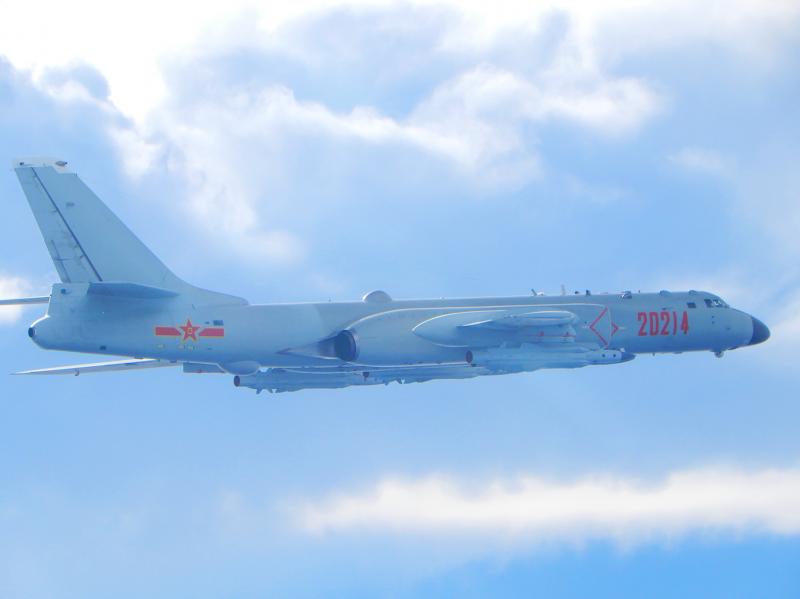The number of Chinese incursions into Taiwan’s air defense identification zone (ADIZ) last year was the highest since 1996, with the majority of them occurring in the zone’s southwest, a government-funded report has said.
Chinese military aircraft entered the nation’s ADIZ on 91 days from Jan. 1 to Nov. 30, the Institute for National Defense and Security Research said in a report on the Chinese People’s Liberation Army (PLA).
Last year also saw the highest number of long-distance training missions by the Chinese military around Taiwan, the institute said, citing just six and 20 missions in 2016 and 2017 respectively.

Photo: Reuters
During the 1995-1996 Taiwan Strait missile crisis, China conducted a series of ballistic missile tests in the waters around Taiwan in the run-up to the nation’s first direct presidential election.
Ministry of National Defense spokesman Major General Shih Shun-wen (史順文) has said that the PLA flew about 380 sorties into the southwest ADIZ last year, a trend that has not been seen in the past.
The institute, which is affiliated with the ministry, said the Chinese intrusions are connected to the frequency of US military activities in the area, and are a warning over the warming of relations between Taiwan and the US.
There could be several reasons for the increase in intrusions, one of which is that China might be testing Taiwan’s military response capabilities, as the median line of the Taiwan Strait does not extend into the southwest ADIZ.
The PLA’s actions are also an effort to increase its presence in an attempt to expand China’s sphere of influence, the institute said.
Another reason could be to intimidate the Taiwanese military and exert pressure on its defenses on the Pratas Islands (Dongsha Islands, 東沙島) in the South China Sea.
An important factor to consider is that China is using marine patrol aircraft to collect underwater and other related information in the area, which is the main passageway for vessels and submarines entering the western Pacific, it said.
The PLA is also hoping to deter Taiwanese and US submarine activity in the region, it added.
The institute said that in the long-term, the intrusions could offer Taiwan certain advantages, such as increasing the legitimacy of US sales of offensive weapons to Taiwan.

AGING: As of last month, people aged 65 or older accounted for 20.06 percent of the total population and the number of couples who got married fell by 18,685 from 2024 Taiwan has surpassed South Korea as the country least willing to have children, with an annual crude birthrate of 4.62 per 1,000 people, Ministry of the Interior data showed yesterday. The nation was previously ranked the second-lowest country in terms of total fertility rate, or the average number of children a woman has in her lifetime. However, South Korea’s fertility rate began to recover from 2023, with total fertility rate rising from 0.72 and estimated to reach 0.82 to 0.85 by last year, and the crude birthrate projected at 6.7 per 1,000 people. Japan’s crude birthrate was projected to fall below six,

Conflict with Taiwan could leave China with “massive economic disruption, catastrophic military losses, significant social unrest, and devastating sanctions,” a US think tank said in a report released on Monday. The German Marshall Fund released a report titled If China Attacks Taiwan: The Consequences for China of “Minor Conflict” and “Major War” Scenarios. The report details the “massive” economic, military, social and international costs to China in the event of a minor conflict or major war with Taiwan, estimating that the Chinese People’s Liberation Army (PLA) could sustain losses of more than half of its active-duty ground forces, including 100,000 troops. Understanding Chinese

US President Donald Trump in an interview with the New York Times published on Thursday said that “it’s up to” Chinese President Xi Jinping (習近平) what China does on Taiwan, but that he would be “very unhappy” with a change in the “status quo.” “He [Xi] considers it to be a part of China, and that’s up to him what he’s going to be doing, but I’ve expressed to him that I would be very unhappy if he did that, and I don’t think he’ll do that. I hope he doesn’t do that,” Trump said. Trump made the comments in the context

SELF-DEFENSE: Tokyo has accelerated its spending goal and its defense minister said the nation needs to discuss whether it should develop nuclear-powered submarines China is ramping up objections to what it sees as Japan’s desire to acquire nuclear weapons, despite Tokyo’s longstanding renunciation of such arms, deepening another fissure in the two neighbors’ increasingly tense ties. In what appears to be a concerted effort, China’s foreign and defense ministries issued statements on Thursday condemning alleged remilitarism efforts by Tokyo. The remarks came as two of the country’s top think tanks jointly issued a 29-page report framing actions by “right-wing forces” in Japan as posing a “serious threat” to world peace. While that report did not define “right-wing forces,” the Chinese Ministry of Foreign Affairs was